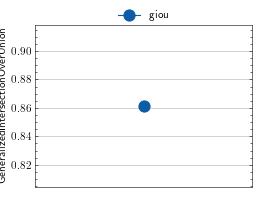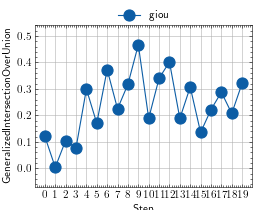Generalized Intersection Over Union (gIoU)¶
Module Interface¶
- class torchmetrics.detection.giou.GeneralizedIntersectionOverUnion(box_format='xyxy', iou_threshold=None, class_metrics=False, respect_labels=True, **kwargs)[source]¶
Compute Generalized Intersection Over Union (GIoU).
As input to
forwardandupdatethe metric accepts the following input:preds(List): A list consisting of dictionaries each containing the key-values (each dictionary corresponds to a single image). Parameters that should be provided per dict:boxes(Tensor): float tensor of shape(num_boxes, 4)containingnum_boxesdetection boxes of the format specified in the constructor. By default, this method expects(xmin, ymin, xmax, ymax)in absolute image coordinates.labels(Tensor): integer tensor of shape(num_boxes)containing 0-indexed detection classes for the boxes.
target(List): A list consisting of dictionaries each containing the key-values (each dictionary corresponds to a single image). Parameters that should be provided per dict:boxes(Tensor): float tensor of shape(num_boxes, 4)containingnum_boxesground truth boxes of the format specified in the constructor. By default, this method expects(xmin, ymin, xmax, ymax)in absolute image coordinates.labels(Tensor): integer tensor of shape(num_boxes)containing 0-indexed ground truth classes for the boxes.
As output of
forwardandcomputethe metric returns the following output:giou_dict: A dictionary containing the following key-values:
- Parameters:
box_format¶ (
str) – Input format of given boxes. Supported formats are[`xyxy`, `xywh`, `cxcywh`].iou_thresholds¶ – Optional IoU thresholds for evaluation. If set to None the threshold is ignored.
class_metrics¶ (
bool) – Option to enable per-class metrics for IoU. Has a performance impact.respect_labels¶ (
bool) – Ignore values from boxes that do not have the same label as the ground truth box. Else will compute Iou between all pairs of boxes.kwargs¶ (
Any) – Additional keyword arguments, see Advanced metric settings for more info.
Example
>>> import torch >>> from torchmetrics.detection import GeneralizedIntersectionOverUnion >>> preds = [ ... { ... "boxes": torch.tensor([[296.55, 93.96, 314.97, 152.79], [298.55, 98.96, 314.97, 151.79]]), ... "scores": torch.tensor([0.236, 0.56]), ... "labels": torch.tensor([4, 5]), ... } ... ] >>> target = [ ... { ... "boxes": torch.tensor([[300.00, 100.00, 315.00, 150.00]]), ... "labels": torch.tensor([5]), ... } ... ] >>> metric = GeneralizedIntersectionOverUnion() >>> metric(preds, target) {'giou': tensor(0.8613)}
- Raises:
ModuleNotFoundError – If torchvision is not installed with version 0.8.0 or newer.
- plot(val=None, ax=None)[source]¶
Plot a single or multiple values from the metric.
- Parameters:
val¶ (
Union[Tensor,Sequence[Tensor],None]) – Either a single result from calling metric.forward or metric.compute or a list of these results. If no value is provided, will automatically call metric.compute and plot that result.ax¶ (
Optional[Axes]) – An matplotlib axis object. If provided will add plot to that axis
- Return type:
- Returns:
Figure object and Axes object
- Raises:
ModuleNotFoundError – If matplotlib is not installed
>>> # Example plotting single value >>> import torch >>> from torchmetrics.detection import GeneralizedIntersectionOverUnion >>> preds = [ ... { ... "boxes": torch.tensor([[296.55, 93.96, 314.97, 152.79], [298.55, 98.96, 314.97, 151.79]]), ... "scores": torch.tensor([0.236, 0.56]), ... "labels": torch.tensor([4, 5]), ... } ... ] >>> target = [ ... { ... "boxes": torch.tensor([[300.00, 100.00, 315.00, 150.00]]), ... "labels": torch.tensor([5]), ... } ... ] >>> metric = GeneralizedIntersectionOverUnion() >>> metric.update(preds, target) >>> fig_, ax_ = metric.plot()

>>> # Example plotting multiple values >>> import torch >>> from torchmetrics.detection import GeneralizedIntersectionOverUnion >>> preds = [ ... { ... "boxes": torch.tensor([[296.55, 93.96, 314.97, 152.79], [298.55, 98.96, 314.97, 151.79]]), ... "scores": torch.tensor([0.236, 0.56]), ... "labels": torch.tensor([4, 5]), ... } ... ] >>> target = lambda : [ ... { ... "boxes": torch.tensor([[300.00, 100.00, 335.00, 150.00]]) + torch.randint(-10, 10, (1, 4)), ... "labels": torch.tensor([5]), ... } ... ] >>> metric = GeneralizedIntersectionOverUnion() >>> vals = [] >>> for _ in range(20): ... vals.append(metric(preds, target())) >>> fig_, ax_ = metric.plot(vals)

Functional Interface¶
- torchmetrics.functional.detection.giou.generalized_intersection_over_union(preds, target, iou_threshold=None, replacement_val=0, aggregate=True)[source]¶
Compute Generalized Intersection over Union (GIOU) between two sets of boxes.
Both sets of boxes are expected to be in (x1, y1, x2, y2) format with 0 <= x1 < x2 and 0 <= y1 < y2.
- Parameters:
preds¶ (
Tensor) – The input tensor containing the predicted bounding boxes.iou_threshold¶ (
Optional[float]) – Optional IoU thresholds for evaluation. If set to None the threshold is ignored.replacement_val¶ (
float) – Value to replace values under the threshold with.aggregate¶ (
bool) – Return the average value instead of the full matrix of values
- Return type:
- Example::
By default giou is aggregated across all box pairs e.g. mean along the diagonal of the gIoU matrix:
>>> import torch >>> from torchmetrics.functional.detection import generalized_intersection_over_union >>> preds = torch.tensor( ... [ ... [296.55, 93.96, 314.97, 152.79], ... [328.94, 97.05, 342.49, 122.98], ... [356.62, 95.47, 372.33, 147.55], ... ] ... ) >>> target = torch.tensor( ... [ ... [300.00, 100.00, 315.00, 150.00], ... [330.00, 100.00, 350.00, 125.00], ... [350.00, 100.00, 375.00, 150.00], ... ] ... ) >>> generalized_intersection_over_union(preds, target) tensor(0.5638)
- Example::
By setting aggregate=False the full IoU matrix is returned:
>>> import torch >>> from torchmetrics.functional.detection import generalized_intersection_over_union >>> preds = torch.tensor( ... [ ... [296.55, 93.96, 314.97, 152.79], ... [328.94, 97.05, 342.49, 122.98], ... [356.62, 95.47, 372.33, 147.55], ... ] ... ) >>> target = torch.tensor( ... [ ... [300.00, 100.00, 315.00, 150.00], ... [330.00, 100.00, 350.00, 125.00], ... [350.00, 100.00, 375.00, 150.00], ... ] ... ) >>> generalized_intersection_over_union(preds, target, aggregate=False) tensor([[ 0.6895, -0.4964, -0.4944], [-0.5105, 0.4673, -0.3434], [-0.6024, -0.4021, 0.5345]])
